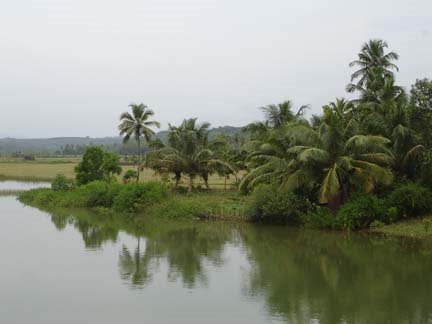A Proverb (ಗಾದೆ: Gāde in Tulu) is a simple, straight and concrete wise saying, popularly known
and repeated in conversations. “ಗಾದೆಟು ಗಂಟು ಇಜ್ಜಿ, ನೀರುಡು ಅಂಟು ಇಜ್ಜಿ” (Gaadetu gantu ijji, neerudu antu ijji) means that there is no knot in
proverbs as is water without stickiness. That is to say, flow of meaning is
easy to understand as is the flow of water, which is pure. It is a plain
expression of truth, based on commonsense or experience of humanity. Wolfgang Mieder, an American proverb scholar,
puts it as “a short, generally known sentences of the folk, which contain
wisdom, truth, morals, and traditional views in a metaphorical, fixed and
memorable form and which is handed down from generation to generation.” They are also called Maxims (Subhashtia = ಸುಭಾಷಿತ)
wherein they teach the basic rules of conduct.
They are universal in nature, appealing to human mind. All proverbs may not have the universal
appeal at all times to come.
Characteristics, toned by place and period, and culture, influenced by
beliefs and customs, of people of a region are well defined in its regional
language. Ethnography and language are linked together when a proverb is based
on ’Context of speech event.’ So a
proverb gives an insight into a Society’s outlook as regards to values and
beliefs.
Tulu Paremiology
Folk knowledge, permeating down the ages, has
crystallized to a specific meaning over a period of time. Paremiology, i.e.
Study of Proverbs, has not developed in Tulu to the standards as in other
languages. Collection of Proverbs
(Paremiography) of Tulu is available in book form here and there, giving basic
meanings. There is no such book, which
gives a critical analysis. There is no
dearth of proverbs in Tulu language.
Many of the Proverbs are encapsulated in the Tulu Lexicon (TL) while
highlighting usage of certain words.
ಮರ ಬೂರುಂಡು, ಪಕ್ಕಿ ಪಾರುಂಡು
The above Tulu proverb (TL page 2520: transliterated herein: ‘Mara
Burundu, pakki parundu’) has been engaging my mind for a long time. On word
to word translation, it means: “Tree fell; birds flew”.
This is a natural
phenomenon.
From Cause to Effect (A-priori)
It is a general knowledge that birds fly when a tree
falls. We are not concerned about how a
tree has fallen but from the cause of a tree-fall, we can come to instance of
birds flying. It is a valid statement,
independently of observation.
From Effect to Cause (A-posteriori)
Birds flew. It is a particular instance to a general
principle of law. It is based on actual
observation. When and why birds
fly? From the evidence, a theory or a
general principle is drawn. They fly
either in search of food or when they are chased or deprived of their shelter.
How they are deprived of their nest? It
could be that the tree has fallen naturally or is felled by human intervention
– rightly or wrongly.
True Propositions
Falling and flying are two propositions. Falling of tree, for various reasons, is
true. Flying is also true, subject to
circumstances. On the event of a falling tree, we can envisage harmful
repercussions from environmental and economic angles.
Allusion
This Proverb evinces allusion or comparison. In a village setting of Tulu Nadu, guided by
matrilineal system, this natural event is alluded to death of a husband when
his wife leaves her in-laws house and returns to her maternal home with her
children, to be taken care of. Matrilineal system is prevalent in Tulu Nadu. In
the extant system, she has no rights of properties of her husband’s ancestral
properties (barring husband’s self-acquired properties and the present legal
laws of the country).
Bhutala Pandya’s Kattu-Kattalegalu (Injunctions)
The Tulu proverb, under study, has universal appeal, even
though it applies to Tuluva Culture. The
custom is one of the injunctions of Bhutala Pandya (as codified in Bhutala
Pandya’s Kattu Kattalegalu, i.e. Codes of Conduct). It safeguards the economic security of women
in Tulu Nadu. In patriarchal society, family-line continuity is ensured by male
child. Women’s economic security is
suffering here under male dominance.
During British regime, Courts of erstwhile Madras State
refer to Bhutala Pandya’s Law of Aliya Santana to answer disputes of right of
property and succession in extended South Kanara of those days. Female members
are heirs and are bound to be maintained irrespective of the fact that eldest
male looks after the administration of ancestral properties for all practical
purposes (even though there have been breaches of trust). A girl is taken to
family fold even in cases when she is going astray.
Many books are available on Bhutala Pandya in Kannada for
the story of heir-ship ordained to be given to Deva Pandya’s sister’s son
instead of his own sons. Translation (by
B. Ramaswamy Naidu, 1872, of original books), is available in Google e-Book
(though there are omissions/garbling at places).
Social Codes of Conduct
In pre-societies, woman was both a bread-winner and a
householder and caretaker. Her position
is a predominant one and she takes part in all activities of a household. This system has landed down from the early
hunting stage to the present day in various societies. Woman takes part in
farming and other ancestral trades or professions, besides rearing her
children. It is very much prevalent in Tulu Nadu even today. Rahul Sanskritayana tells a story of such a
system in his Story Book: ‘Volga to Ganga’ (Note: There is a Kannada
translation of this Book). Elsewhere, a
woman is considered as a ‘housewife’ and man as a ‘bread-winner/earner’, even
in industrially developed countries some years ago.
Economically Conditioned
The present-day woman is doubly burdened in spite of
economical independence. Besides having primary responsibility of house-stead
chores, she works outside in schools, hospitals, offices, factories, scientific
and social organizations, etc. Generally,
she is exploited, while competing with male dominated socio-economic spheres
and has to content with low-paid jobs (barring certain exceptions).
This is valid even in industrially developed countries.
She has to be a ‘housewife first’ and then a ‘wage-earner’. These days Internet based matrimonies, seek
‘homely brides’ but in the end hunt for working girls with transferable jobs, preferably
with heavy purse.
When the Last Tree is cut…!
Environmental Disaster: When I was thinking of writing on the subject, I came
across a letter to ‘Quote Investigator’ in the Net seeking whether the
originator of the following Proverb is Alanis Obomsawin, Prophecy of the Cree
Indians, Osage saying, Sakokwenonkwas, Greenpeace, Anonymous, Apocryphal or
not:
“When the last tree has been cut down, the last fish
caught, the last river poisoned, only then will we realize that one cannot eat money”
The disaster is conceivable.
ELF: There was film ‘If a tree falls’.
It is story of Earth Liberation Cell (USA) - its rise and fall.
Falling Tree & Human Stress Syndrome Effect
“Even though plants do not show any change to the
naked (or lensed) eyes, when a human is in their presence, systematic
biological changes have been discovered that have grave effects on plant life
when a person is within 300 metres. This
effect is Human Stress Syndrome.” (q.v. www: getodd.com)
When a tree is about to fall and if a human is around,
cell walls of the tree get brittle because of Human Stress Syndrome and it
falls with a familiar sound. If a tree
falls in a forest without the proximity of human, it does not make a sound. The
sound is due to Ultraviolet gas emitted by human stressed trees. Lumber without
human stress effect is spongy and hence not very strong, thereby rendering it
unfit for building.
Summing up
In India, there are many laws now on women’s liberty,
empowerment, domestic violence, dowry deaths, molestation, etc. A girl is not safe irrespective of these
laws. The economic freedom of women is
prevailing even today in Tulu Nadu in spite of demerits of the decree of
Bhutala Pandya. A woman is taken care of
by her husband after marriage and is helped by her maternal family when in
need.
-Hosabettu Vishwanath (Pune)



http://alokrai2001.blogspot.in/2013/02/why-tulu-language-should-be-added-in.html
ReplyDelete